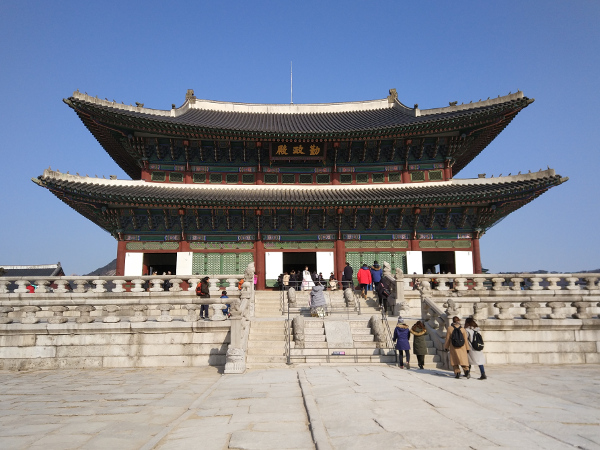Cours de coréen ᚛ Level 1 - My First Steps in Korean (Lessons 1 to 30) ᚛ Leçon 30 - The place particle with action [에서]
The place particle with action [에서]
In the previous chapter, we learned how to use the 에 particle to mark a place. However, it could only be used when talking about:
- a destination towards which we are heading
- the presence or absence of something or someone, without describing any particular action
- an action performed on a specific object
The particle 에서, on the other hand, indicates a place in which an action takes place.
Expressing a place with action
The particle 에서 makes it clear that something is happening in a specific place. By using the particle 에서, we expect to find an action verb at the end of the sentence.
집에서 방 청소해.
→ I clean my room at home.
부엌에서 핸드폰을 떨어트렸습니다.
→ I dropped my phone in the kitchen.
발리에서 서핑을 배울 거예요.
→ I'm going to learn to surf in Bali.
매일 공원에서 산책을 했습니다.
→ I walked in the park every day.
저는 프랑스에서 태어났습니다.
→ I was born in France.
Differences between 에 and 에서
It is necessary to distinguish between 에 and 에서 which describe two different things:
- If we indicate a destination with a verb of movement (to go, to return, to go up… etc), we use 에.
- If we indicate a place and simply describe the presence (있다) or absence (없다) of something or someone, we use 에.
- If we indicate a place and we describe an action (eating, doing, studying, playing, speaking... etc.), we use 에서.
에서 is literally the particle for "a place in which something happens".
Note: the verb 살다 (= to live) can be used with both particles, but 에서 will create emphasis on where you live.
저는 서울에 살아요. /
저는 서울에서 살아요.
→ I live in Seoul.
Combination of particles
En savoir +
Exercises
En savoir +
Apprendre le coréen n’a jamais été aussi facile ! Le livre numérique Coréen pour tous ! contient tout le nécessaire pour apprendre le coréen afin de passer du niveau débutant au niveau intermédiaire.
Une première partie vous explique les bases fondamentales du coréen en détail avec de nombreux exemples et est suivie de 23 chapitres vous enseignant pas-à-pas la langue coréenne. Suivez les aventures de Jenny, une jeune Française partant en voyage en Corée du Sud et à qui il va arriver de nombreux périples. C’est à travers ses dialogues issus de situations de la vie courante que vous apprendrez le coréen utilisé au quotidien en Corée. Enfin, des points de culture coréenne parcourent le livre pour mieux comprendre la façon dont les Coréens vivent et appréhendent leur langue.
Vocabulaire, grammaire, conjugaison, cet ouvrage complet accompagné de dialogues et d’audios réalisés par des acteurs Coréens natifs vous permet de surmonter toutes les difficultés du coréen de manière ludique et avec une grande facilité.
En savoir +

